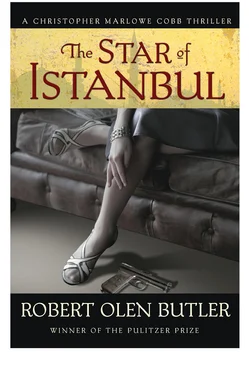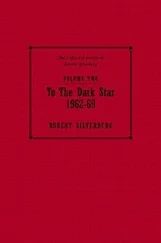There was one more deck for the first-class travelers to promenade. I emerged on B Deck. It was more crowded than I’d expected. First class was only half booked in this wartime civilian crossing, but the whole long length of the railing was shoulder to shoulder and there was a throng of others on the promenade as well. I realized the first all-ashore whistle had not yet sounded; the visitors were still on board.
If there’d only been the loose gathering of swells I’d expected, it would have been interesting to stroll along and try to guess which body belonged to the woman’s voice I’d heard. But now I focused on casually looking for Brauer. If he was even here. I moved forward on the promenade, keeping close to the deck wall, and ahead was a particularly large grouping of visitors circled up. I recognized newsmen at once. I drew near as an intense flurry of questions arose, with one male voice prevailing. I caught only a few of his words, the end of a question: “. . a new film?” The reporters fell silent and no doubt all raised their pens, and from the unseen center of this circle came a woman’s voice.
It was her.
I slid along the outer edge of the circle of newsmen, looking for a sight line between heads, as she responded with words that sounded offhand and faintly put-upon but nevertheless were ringingly projected, even through the wall of newsmen. Yes, an actress. “I’m going abroad for personal reasons,” she said. “No films.”
And I found a place to see through three layers of necks and shoulders. Not just an actress. A star. Her face was recognizable from the magazine shelves of any newsdealer in almost any month of the year: Selene Bourgani. She wore a rolling hemp sailor hat as large as a porthole, with Tuscan trim edging the brim, and with her hair hidden in some thick, black, invisible roll beneath it, all of which framed her dusky thin face with its vast, dark eyes, its wide mouth in a perpetual almost-pout, a face everyone on the deck had seen, at some point or other, flickering before them in a movie theater. The Forest Nymph. Sister of the Sea. The Girl from Athens.
When it was clear she had nothing further to say about her upcoming film plans, the voices all rose together again and the reporters’ bodies shifted and I lost my view of her. I slid on along the circle, trying to recapture the vision of Selene Bourgani, whose sad and uplifting life story played over and over in the periodical press.
I passed the apex of the journalistic circle, and as I moved back toward the railing and the crowd grew thicker, I glanced away. There, quite near, leaning at the railing with his back to the dock, not looking toward the impromptu press conference but away, down the promenade, with an air of casual indifference, was Walter Brauer. The indifference was another calculated pose, it felt to me. What man would not be interested in a woman the press called one of the world’s most beautiful? He was holding a cigarette — rather effetely between the tips of his thumb and forefinger with his other fingers lifted — and he was blowing a plume of smoke toward the bow.
I took all this in while Selene Bourgani denied an interest in the London stage. I looked away from Brauer. I made another step to the side and another and I could see her again, in profile now, her long, straight nose beautifully at odds with the usual standards of beauty of this age. I thought: I bet her feet are large too and her hands and she is all the more beautiful for defying this world’s conventions in these details . And I was still entranced by her nose, absorbing even the precise curve where its bridge met her brow, a perfect fit, I fancied, for my fingertip, when she said, “I am a film actress.”
She’d hardly finished the sentence when one reporter leaped in before another hubbub of questions could begin. “Miss Bourgani,” he said, “the world is at war.”
He was speaking from somewhere to her left. She turned her face instantly to him — in my general direction as well — and her dark eyes riveted him and his voice snagged as if he were suddenly beginning to choke. He managed to stammer a couple of meaningless vowel sounds and then he fell silent.
The other reporters all laughed. But it was a sympathetic laugh. Hers was a face that could stop a thousand ships.
“Yes?” she said, encouraging him to go on with his question, giving the impression that she’d spoken softly, though I could hear her clearly.
“Miss Bourgani,” the reporter began again. “In light of the German threats and this being a British liner, are you afraid to be traveling on the Lusitania ?”
She turned her face away from the questioner, the turn energized by a sharp, mirthless laugh, the sort of laugh that suggests some little private irony.
Then she fell silent, and everyone in the crowd fell silent with her. She let the silence tick on, consciously playing it, no doubt. Ever the actress, her timing was splendid: she slowly surveyed us until that precise, peak moment when all her listeners had finally Brownie-snapped their bodies and shallowed their breathing to a stop. Only then did she speak. “I am afraid of nothing,” she said.
I woke somewhere in the dark early hours of what would be our first full day at sea, woke to the sounding of the Lusitania ’s forward triple-chime whistle. I dozed off, but a few minutes later the whistle sounded once more, a harmonized choir of basso baritones crying out in the night. My mind began to work, and I knew I would remain sleepless for a long while. My initial thinking was pleasantly desirous: I wondered if she was awake in her bed as well, just around the corner, waiting for the whistle to blow again, quaking very faintly from the distant, vibrant working of our turbines. I found myself afraid I would never have a chance to speak to her beyond a passing hello.
I should have been thinking about Walter Brauer. What he was doing. What might have been in his mind on deck yesterday morning. And then I grew afraid that I was ill-suited for the work my country had asked me to do.
I was rushing across the North Atlantic to war, but with an intention I’d never had before. I needed to sort out what I was doing, give myself a pep talk. I was a reporter. A war correspondent. I knew how to look for news, for the truth. It had always been my job to snoop around, and because I knew how to do that well, in Mexico I’d happened upon news of deep importance to Washington. Private importance. So now the process was inverted. Now the snooping would be for Washington and I would just happen upon stories for the Post-Express . I wanted to do this. I had seen too much of the savage impulses of men, impulses that we ultimately could not deal with as individuals. I was lucky to be an American. We Americans were also men and could foul things up pretty badly, but our declared ideal was to find a way to make it possible to stop the savagery. To govern without savagery. To live with other governments without savagery. To live with ourselves without savagery. It is what we believe. And so I remained Christopher Cobb, reporter, even as I began to play a more important role in the world. But I was used to finding things out by following the acts of men that are clear to see, out in the open, with their immediate goals readily understandable. This work I was doing now was different.
The Lusitania ’s whistle sounded again.
Now my mind was all shadow and fog.
For all this thinking, I didn’t feel very peppy.
I rose and put on my pants and shoes and overcoat, intending to get some air on deck. I stepped out of my cabin and went to the right and then turned left into the portside corridor. Bourgani’s direction, not Brauer’s. There were two staterooms en suite along here, but I remembered the deck plan from when I booked my passage. Only the aft suite had its own bath. She would surely be in that one. I approached the door, treading softly. A20 and A22. I stopped. I listened. But all I heard was my heart thudding in my ear like the engine of our ship deep below. This was foolish. I moved on and through the door and out onto the A Deck promenade.
Читать дальше












